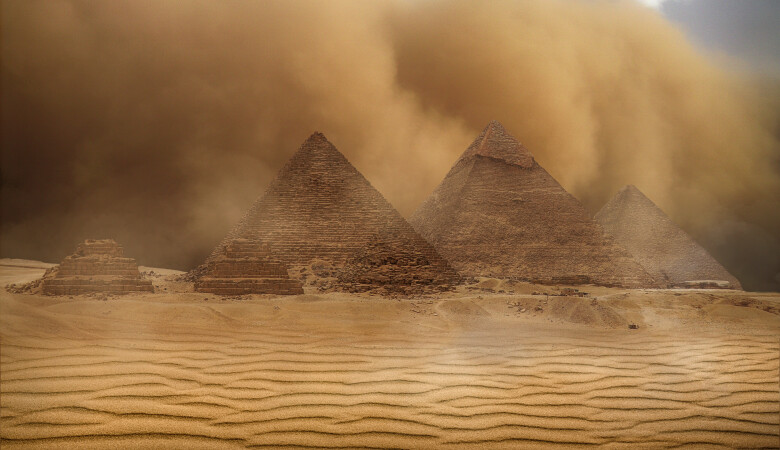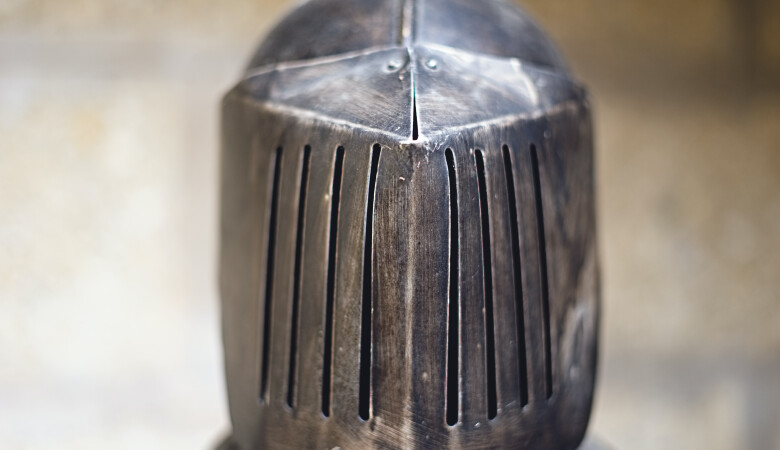The Righteous King and Outpoured Spirit Transform a Corrupt World (Isaiah Sermon 34 of 80)
December 16, 2012 | Andy Davis
Isaiah 32:1-20
Judgment, Government & Authority
Andy Davis preaches a verse-by-verse expository sermon on Isaiah 32:1-20. The main subject of the sermon is how God purifies the world through the outpouring of the Holy Spirit so He may rule over it.
- SERMON TRANSCRIPT -
Turn in your Bibles to Isaiah chapter 32 as we seek to hear God's word from this chapter. There are many miseries in the world, there are many forms of suffering and lots of groaning, and we as a nation, I know, groan and are grieved by what happened this week in Connecticut. All over the world people groan in a different way. Groan under the oppression of unjust or wicked governments, governing officials who use their position of government, their position of authority, whether ultimate in that nation or governors or sub-rulers in that nation, who use those positions of influence to make themselves rich, to bring pleasure and honor and accolades to themselves, fatten themselves in some sense at the direct expense of their people, this has been going on from the beginning of human governments. Proverbs 29:2 covers this and says, “When the righteous are in authority, the people rejoice, but when the wicked rule, the people groan.” And that is true.
Now, as we come to this time of year in which we celebrate the incarnation, the birth of Christ, maybe one of the more famous passages in Isaiah, Isaiah 32, is not one of the famous chapters, but we know Isaiah 9:6-7, which says, “For to us a child is born, to us a son is given.” What's the next part? “And the government will be on his shoulders, and he will be called the wonderful counselor, Mighty God, Everlasting Father, Prince of Peace. Of the increase of his government and of peace there will be no end. He will reign on David's throne and over his kingdom, establishing it and upholding it with justice and righteousness, from that time on and forever, the zeal of the Lord Almighty will accomplish this.” So as we come to Isaiah 32, right away in verse one, we have this issue introduced, “Behold, a king will reign in righteousness.” So we have a king and rulers, plural, will rule with justice. So we are addressing the issue here of a righteous government, a righteous king and sub-rulers under him who use their positions righteously, not like the situation when Isaiah wrote. So we have a contrast with the wickedness and the corruption of leaders that were ruling in Jerusalem in his day, and so this is a the point of contact with us, there are corrupt governments all over the world.
I've been to Haiti five different times. Haiti was ranked by the International Red Cross as the fourth most corrupt government on the planet, and there was a story in Reuters after the 2010 earthquake in January 2010 that there was concern that this tragedy would bring billions of dollars of aid into the country and the heritage of the government of that country was of immense corruption, and it would just be siphoned off and never really get to the needy. That's Haiti.
Recently, I was in China, and while I was there, the English language newspaper was slid under our door, and so I read it and the headline story there was of corruption in government, and I thought it was interesting, just given the state control of every apparatus there, I just thought it was interesting to have this story in a state-run English language newspaper, lots of different themes I could go off on, but just one of the issues there are just building contracts that are given with government money and these buildings are built. And in the Shandong Province, along the coastline there are these magnificent living quarters and 80% of them are housed by party officials.
My first mission trip in 1986 was to the nation of Kenya. While I was in there, while I was there, I was in a small place called Moi's Bridge, and Moi's Bridge between Eldoret and Kitale, it was named for the President of the country, President Daniel arap Moi. While I was there, he visited his little namesake town and he waved to me, I think it's 'cause I was the only white face in the crowd, so he saw me and pointed at me and waved, so I felt honored for a day. But in 2007, he stepped aside from power in 2002 and he reigned from 1978 to 2002, it was uncovered that over two billion dollars of Kenyan government money were filtered to 30 different other nations with a shell game that left his two sons worth somewhere between 500 and 700 million dollars. I was talking recently to Ashok, one of our elders about the process that they're going through with adoption, and he just said, “It's very slow,” and, “Well, what makes it so slow?” And he just says, “Well, in India, everything is lubricated by bribes, nothing really moves unless you're willing to do that.” And this is not just in India, it's just an issue everywhere.
The corruption of human government, now, someone once said, “Power corrupts and absolute power corrupts absolutely.” I don't know that that's entirely true, I know it's definitely not true when it comes to Jesus. He has absolute power and it doesn't corrupt him at all. And that's our great hope in Isaiah 32 of a righteous ruler who will have absolute power and will not in any way be corrupted by it. And even more amazingly, rulers, plural, under him, who will be like him, righteous, and will use their positions well, and that is our great hope. I don't think it's true that power corrupts, I think the human heart is already corrupt, and I think what happens is they get into positions where they can show the corruption that was already there by these temptations that surround them. I think that's really what happens, the power draws forth the corruption that's already there, it doesn't put it in. And so when we come to Isaiah 32, we come with hopes and yearnings for a righteous king, a righteous government, one that will not take advantage of the people that are crushed, and the great joy of this chapter is that it's a prophecy that says it will happen. It will happen, but it will only happen, according to this chapter, by the power of the out-poured Spirit of God. Only when the Holy Spirit is poured out from on high will this transformation occur.
So the chapter unfolds in three basic sections, verses 1-8, we have the purpose of God and that is noble rulers instead of wicked ones, God's purpose. Secondly, in verses 9-14, we see God's purging as he clears the building site for the righteous society he said he's going to build in verses 1-8. So he's going to bring judgment on the nation of Judah for their wickedness and their sins, and he's going to purge away the evil rulers and the evil society that brought about the need for that purging. And then thirdly, God's power, the out-poured Spirit of God producing a harvest of righteousness. That's how the chapter unfolds. So let's look at the first section and that's Isaiah 32, 1-8 beginning, as I've already mentioned, with verse one, “Behold...”
And by the way, every time the NIV gives me a see, I'm probably gonna put behold, is that okay? I mean, I'm just a big fan of ‘behold.’ I think it's just an awesome word. I would challenge you, use it in a sentence this week sometime. It's hard to do actually, but anyway, that's what makes it special. It's a special word, “Behold the king,” isn't that marvelous? Just, Jesus unveiled in the scripture here.
I. God’s Purpose: Noble Rulers Instead of Wicked Ones (vs. 1-8)
“Behold the king will reign in righteousness and rulers will rule in justice.” Now, who is this righteous king of verse one? And I think there must be a multifaceted answer that's given here. Ultimately as a Christian, as a Christian reader of the Old Testament, I see Jesus here, but I think there's nothing wrong with seeing a Davidic or a son of David who will reign after the Assyrian invasion, perhaps Hezekiah himself or a future godly king like Josiah. I don't think it's necessarily bad to see the Christian impact or the impact of the Gospel of Christ on Gentile society in the two millennia after Jesus' Ascension and before he has returned, that's in view as well. So I see all of that going on here. But ultimately, this is Jesus Christ, and below him are sub-rulers, and really most of the chapter is about them, not much about him. Now, he sets the agenda, he sets the example, but there's just not much said about the righteous king, rather about the rulers who rule under him, princes in some of the translations here. In Hezekiah's day, the Davidic king would sit on the throne, the son of David, and his sons would be his counselors or government officials or friends of his sons, etcetera, or friends of the family. But I see all of this in view here, princes or rulers who rule under the king. And in Hezekiah's day, he was not well served by his counselors, these were the ones that were urging him to go down to Egypt, these were the ones who, apparently, according to this chapter, are thoroughly corrupt and are using their positions with malice and wickedness, poorly served, and perhaps just at a very simple level, Isaiah is predicting that after the Assyrian invasion, after the purging that he mentions in the middle of this chapter, God is going to establish a reformed government, a righteous government, in which the king will reign in righteousness and the rulers under him will rule with justice just as he does. But for me ultimately it's pointing to Christ as the king of all kings and the lord of all lords.
Now these rulers, it's said of them in verse two, again, speaking of the godly society, the righteous society that is coming, this is a future language, “A king will reign in righteousness,” in the future, “And rulers will rule with justice.” These rulers are described here in verse two, “Each man will be like a shelter from the wind and a refuge from the storm, like streams of water in the desert and the shadow of a great rock in a thirsty land.” This is the vision for society, justice. The king reigning with justice, and so also the rulers under him. Justice is that which lines up with the character of God expressed in the laws of God. As God establishes his justice, his righteousness, this king and the rulers are going to do everything based on that justice and that righteousness rather than the injustice of wicked rulers.
In verse three and four, I think we have the sense of the ministry of the word of God. There are different ways of understanding this, but it says, “Then the eyes of those who see,” sometimes called seers, that would be prophets, that's one interpretation, “Will no longer be closed and the ears of those who hear will listen. The mind of the rash will know and understand, and the stammering tongue will be fluent and clear.” So you've got to see in those two verses, a very strong emphasis on word, their words here, concepts, things that we know and can understand, things that we can now speak clearly. And so for me, the backdrop of this must be the word of God, and those who see the word are prophets, those who teach our priests frequently, the mouth of a priest must teach the law, the word of God, and so in this righteous society, the word of God is going to be flowing and richly ministering to people and transforming minds and hearts, and people's blind eyes will be healed and they will see the world as it really is, and not corrupted and twisted, they will understand well from the word of God. And they will speak clearly, again, God's words to one another, the word will just flow richly, and so you could see even offices like prophet and priest being established so beautifully and the word of God transforming that society.
And then in verse eight, noble leaders making noble plans and actually carrying them out. I love verse eight, “But the noble man makes noble plans and by noble deeds he stands.” Some of your translations may have the word liberal, I think in that sense of a free flowing of generosity, we don't use the word that much that way anymore, but I think that's where you get the idea of liberal arts, the free flowing of blessings and of richness going, but I like the word noble a little bit better in the NIV, and it's a beautiful word. So the noble man, I think in this case, the ruler under the righteous king, the noble man, his character conformed to the righteous king, he is righteous like him, he loves righteousness, hates wickedness, that's the essence of his nobility. He wants to do noble things with his position of authority, He has noble plans for the people and for the government and for his positions, and he actually carries them out, it's not empty campaign promises here, but he actually has good intentions and he sees them through. By contrast in verses one through eight, especially verses five through seven, we have the situation as it was before, this is where Isaiah is standing and looking ahead, ‘O I look forward to the day when, won't it be incredible when, at last a righteous king will be there and rulers under him will rule with justice, but right now it is not so.’ And so we can resonate with that in different eras in history, in different parts of the world, the corruption and the wickedness of governments reach different levels, but it's something we are aware of. Look how it's described here in verses five through seven, “No longer...” Again, it's speaking positively about the future, “No longer will the fool be called noble nor the scoundrel be highly respected.” So in other words, the fool here is like the fool in the book of Psalms and Proverbs, a morally corrupt individual who is, I think one of those rulers or leaders, and he's established and he's honored and praised and given accolades and trophies and medals and titles of honor and all of that, or like the wicked king Herod, when he's speaking in Acts 12 and he's wearing these radiant robes and they cry out, “This is the voice of a god and not a man,” but he's a fool, he's a scoundrel, he's wicked and yet he's highly esteemed and praised because he can give them food, he's in charge of their food supply and they want stuff from him, and now we see that in our government, don't we? People are praised and honored or re-elected because the government programs can get them what they want, and that's a flaw in the system.
And so here it says in verse 5, “No longer will that happen, the fool will not be called noble or the scoundrel will be highly respected, for the fool speaks folly, his mind is busy with evil.” Ultimate evil, for the fool. Psalm 14:1, “The fool says in his heart, there is no God.” He really says that. He may speak the word God and all of that and give outward lip service, but in his heart, he really doesn't believe in the God of the Bible. He doesn't believe in him, he doesn't believe that God is a consuming fire, he doesn't believe that God is light and in him there's no darkness at all. He doesn't fear the Lord, Romans 3, “There is no fear of God before their eyes.” He has no fear of God, and so he doesn't think properly about God, his mind is busy with evil, he speaks foolishness and he practices un-godliness and he spreads error concerning the Lord, he doesn't think properly concerning the Lord. His doctrine is wrong and he spreads it.
This is the corrupt leader, the corrupt government official, and how does that work in terms of his carrying out of his office? Well, the hungry, he leaves empty and from the thirsty, He withholds water, so sins of omission, and sins of commission. Sins of omission, the hungry and the thirsty do not get what they need. This is just a symbol for the role of government in meeting needs and this man is withholding it. It's really amazing, most of the hunger in the world is so because of the wickedness, the direct wickedness of rulers and officials who withhold food. East Africa had this again and again where food was actually used as a weapon in civil wars in the Sudan and in other places. In the west, there was plenty of food and it was flowing, but it never got there because of the corruption and wickedness of people. And so from the hungry he withholds food and from the thirsty he withholds drink. And sins of commission, wicked things he actually does in verse 7, “The scoundrel's methods are wicked, he makes up evil schemes.” Do you see the schemes, the plots and the planning?
If you think about wicked evil king Ahab who wanted a man's field as vineyard, do you remember that? And Jezebel, and they plotted and schemed to have him killed, Naboth, and have his vineyard taken over by the government, by him. And that's the kind of wicked scheming that goes on, we will use our position of power and authority to make ourselves rich and to crush the poor and needy. And so he makes up evil schemes to destroy the poor with lies, even when the plea of the needy is just. So this is the corruption of government, of the governing officials which Isaiah sees and says, “No longer will that happen.” By direct contrast, we have verse eight again, “But the noble man makes noble plans, and by noble deeds he stands.” What a striking contrast. That's verse 1-8.
II. God’s Purging: Judgement Clears the Building Site (vs. 9-14)
Now, in verses 9-14, Isaiah makes very clear the purging that's going to come, there is a judgment coming on Judah, and these wicked leaders are gonna be purged out. And it's described very painfully and powerfully here in verses 9-14, “You women who are so complacent, rise up and listen to me, you daughters who feel secure, hear what I have to say. In little more than a year, you who feel secure will tremble, the grape harvest will fail, the harvest of fruit will not come. Tremble, you complacent women, shudder, you daughters who feel secure, strip off your clothes, put sackcloth around your waist, beat your breasts, for the pleasant fields and for the fruitful vines, and for the land of my people, a land overgrown with thorns and briers. Yes, mourn for all houses of merriment and for this city of revelry. Fortress will be abandoned, and the noisy city deserted. citadel and watch tower will become a wasteland forever. The delight of donkey is a pasture for flocks.”
And so, while this is essentially, this chapter is essentially good news, it comes in three parts. The first part is good news and joy of a king that's gonna reign in righteousness and rulers ruling under him in justice, and then the third part shows God's power and bringing it about and the richness of life under that new government. In the middle, though, is the bad news of the purging that has to happen to bring it about, a dire warning of coming judgment. And the proper response to this warning was to be humbled, to be broken-hearted, to put on sackcloth, to weep and wail and to seek forgiveness from God, that's what the Lord wanted when they heard Isaiah's prophecy.
Now, he focuses here on ungodly complacent women in particular. Verses 9-11 speaks again and again of the complacency of these women. It's not an easy concept, the idea of complacency, but in verse nine in the NIV it gives us complacent, the word complacent. Verse 9-10, it says that they feel secure. Verse 11 again, complacent and feel secure, again in verse 11. So what is this complacency? This is a feeling of arrogant self-righteousness and unfounded confidence that this time of luxury and security will go on forever, because God just loves us evidently, because we're living such a luxurious life, and it's just gonna go on and they're not worried or concerned at all about sin or God's holiness or impending judgment, these things aren't even on their radar screen. That's complacency. It's a spiritual laziness, spiritual fatness that causes you to be lethargic spiritually and to not rise up and act as God wants you to.
"That's complacency. It's a spiritual laziness, spiritual fatness that causes you to be lethargic spiritually and to not rise up and act as God wants you to."
Now, he zeros in on the women, I think, just as a representative, representatives of society. It's not that the women were particularly worse than the men, it's not that, but I think it's just giving us glimpses of society, and he did this earlier in Isaiah 3. He talks about the women of Zion being haughty and arrogant, walking along with mincing steps and flirting with their eyes and ornaments jingling on their ankles, and he talks about all their equipment. We read about it in Isaiah 3:16-24, “In that day, the Lord will snatch away finery, the bangles and headbands and crescent necklaces and earrings and bracelets and veils and head dresses and ankle chains and sashes and perfume bottles and charms, signet rings and nose rings and fine robes and capes and cloaks and purses and mirrors and linen, garments and tears and shawls.” A bunch of equipment mostly for beauty, but they weren't beautiful. These women were corrupt morally. Amos also picks up on them, “They lounge on ivory couches,” it says, “And they call to their husbands, 'bring us more drinks.'” And so that's a picture of the luxury and the complacency of these women. In Isaiah 4:4 it says, “The Lord will wash away the filth of the women of Zion, and he will cleanse the blood stains from Jerusalem by a spirit of judgment and a fire.” So judgment is coming. And if you look at verse 10, it's imminent, it's very, very soon. Now, the Assyrian invasion was 701 BC, so if you take verse 10 seriously, this prophecy must have been like 702, 703 BC. Why? Because look at verse 10, in the NAS it gives us, “Within a year and a few days.” It's very precise, “Within a year and a few days.” So if a prophet comes and says, “In 369 days, the invasion's coming,” take that really seriously, “Within a year and a few days, you will be troubled, O complacent daughters.”
And then he turns agricultural to give us a sense of that. Again, just as the women were representative for all the people, so the agriculture is representative of the judgment that's coming. The grape harvest is going to fail. Judgment is coming on the land, thorns and briars are going to cover the fruitful fields. This was a rich land with ample harvests, it was rich. The soil was rich, you wouldn't have to irrigate it with a foot pump, he says in Deuteronomy 11. No, not at all. This is a land with rich soil, and it's drenched with autumn and spring rains. It's a land the Lord your God watches over and cares for continually, directly. It was a land flowing with milk and honey. But he said very plainly in the blessings and curses, in the curses section, if you turn away from me and if you follow false gods, and if you are wicked and evil, I will make the ground beneath your feet like bronze in the sky over your head like iron. There will be drought and famine and I will bring judgement. And you have again, this issue of thorns, a picture of God's judgment. This time of luxurious revelry, of sinful complacency will come to an end one way or the other.
Now, he urges them to act. Look at the verbs, look at verse nine, “You women who are so complacent, rise up.” You see that? “Get up off the ivory couch. Rise up and listen to me. Listen to my words, you daughters who feel secure, hear what I have to say. Get up. Shake off the lethargy and listen to me.” That's what the prophet is saying, “Tremble, you complacent women, shudder, you daughters who feel secure, strip off your clothes and put on the sack cloth. Beat your breasts for the judgment that's coming,” take this very seriously. He's urging them to do that, because the judgment is coming and it's not just agricultural, it's gonna be on the cities. Verse 14, “The fortress will be abandoned, noisy city, deserted, citadel and watch tower will become a waste land forever. The delight of donkeys, pasture for flocks.” So it's a prediction that the walled cities of Judah will fall and they did. Even in the Assyrian invasion, all of them fell except Jerusalem, that was the only place that didn't fall. All of the other cities of Judah fell to the Assyrians, people died, city walls were pulled down, citadels were abandoned, these things happened even in the Assyrian invasion. How much more than the final deportation of Judah under Babylon a number of years later?
And so we see in section one, God's purpose. His purpose is to have a righteous king ruling in righteousness and justice and rulers ruling like him under and not like the old system in which there are wicked evil rulers who are using their positions for corruption. Section two, we see God's purging as he's going to bring judgment on this land and purge away the wickedness that's bringing on this invasion. Thirdly, we have God's power, the out-poured Spirit of God, which alone can transform this situation and give us what verse one says will happen.
III. God’s Power: The Outpoured Spirit Produces a Harvest of Righteousness (vs. 15-20)
Verse 15-20, "Until the Spirit is poured upon us from on high and the desert becomes a fertile field and the fertile field seems like a forest and justice will dwell in the desert and righteousness live in the fertile field, and the fruit of righteousness will be peace and the effect of righteousness will be quietness and confidence forever. My people will live in peaceful dwelling places, in secure homes and undisturbed places of rest. Though hail flattens the forest and the city is leveled completely, how blessed you will be, sowing your seed by every stream and letting your cattle and donkeys range free."
So that's God's power poured out by the Spirit. So this purge that's going on in verse 14, citadels crushed, places abandoned and all that, that's gonna continue, verse 15, “Until.” See that? And so the turning point there is the outpouring of the spirit of God. The judgment will come on the country until God says, “Stop. And now I'm gonna pour out my Spirit.” Now, other nations, Gentile nations, they get the purging, they just don't get the spirit poured out. These are God's people and that's the only difference there is. Just because there's smoldering heaps of ruins in Europe after World War II doesn't mean a righteous society is gonna spring up afterwards.
Actually, what's probably happening is roving bands of men are organizing themselves to take advantage of the anarchy and go right back into the old system of corruption and wickedness. Without the Spirit of God, that's all we will ever do. That's what our hearts are. We must have a transformation and only the Spirit of God can bring it about. Ezekiel put it this way, Ezekiel 36:25-27, “I will sprinkle clean water on you and you will be clean. I will cleanse you from all your impurities and from all your idols and I will give you a new heart and I will put a new spirit in you and I will remove from you your heart of stone and give you a heart of flesh. And I will put my Spirit in you and move you to obey my commands and my laws.” That's the only way the change could ever happen, by the out-poured Spirit of God, the spirit is poured out from on high. Isn't it interesting the number of times that verb is used with the spirit? Spirit poured, the pouring of the spirit. Isn't that interesting?
It's in there many times, Isaiah 44:3-4, it says, “For I will pour water on the thirsty land and streams on the dry ground. I will pour out my spirit on your offspring and my blessing on your descendants. They will spring up like grass in a meadow, like poplar trees by flowing streams.” In the Hebrew poetical structure, the pouring down of the water equals the pouring out of the spirit and the agricultural images, the plants growing up, those are people whose hearts are no longer spiritual deserts, but are now fruitful, rich, righteous gardens that are producing good works for God. And it only happens by the spirit, as he is poured out. And so verse 15, “The Spirit is poured upon us from on high, and the desert becomes the fertile field.” You know what the desert is? It's the wicked, unregenerate human heart, that's the desert, and only by the power of the Spirit of God paid for by the blood of Jesus Christ, only in that way does the human heart get changed.
"You know what the desert is? It's the wicked, unregenerate human heart, that's the desert, and only by the power of the Spirit of God paid for by the blood of Jesus Christ, only in that way does the human heart get changed."
And as a result of that change, verse 16, “Justice will dwell in the desert and righteousness live in the fertile field.” Oh, how sweet is that. Now at last, these rulers under the righteous king, they yearn for righteousness and justice as much as the king does, and they wanna live it out. And what are the effects? Verse 17, verse 17 is the keeper verse. Well, they're all good, aren't they? They're all God-breathed and useful. But some just shine more radiantly than others, don't they? Star differs from star and splendor. Some are just more glorious than others. Verse 17 is a glorious verse. “The fruit of righteousness will be peace. The effect of righteousness will be quietness and confidence forever.” Isn't that sweet? Oh, what a magnificent verse.
One of the things Tom Knight and I do every week is try to figure out what the cover verse is gonna be. So this one made it on the cover. Not to say the other verses aren't great, they are, but this is the cover verse. It's magnificent, a picture of no longer complacency, but peace. Now, what's the difference? We'll talk about it in a minute, but there's a big difference. Not complacency, but genuine peace with God through our Lord Jesus Christ, and confidence and assurance.
And the final words are just kind of an Old Testament picture of a prosperous life, “My people who live in peaceful dwelling places, in secure homes, in undisturbed places of rest. Though hail flattens the forest and the city is leveled completely, how blessed you will be,” how blessed you will be, “sowing your seed by every stream and letting your cattle and donkeys range free.” And you could say, “But I have no cattle and donkeys.” Now I could say, “Well, God promises you here, you're gonna have some.” Alright. But I'm not going there, I'm just saying this is just that Old Testament agricultural image of rich blessing that's going to come as a result of the work of God here.
IV. How Isaiah 32 Preaches Christ
Now, how does this chapter preach Christ? Does this chapter preach Christ? Say yes, yes, it does. Of course it preaches Christ. The spirit of prophecy is the testimony of Jesus. And so right away, verse one, “Behold the king, a king will reign in righteousness.” That king is Jesus Christ, ultimately, he is the king of kings, and he's going to come in his heavenly glory, and he's gonna sit on his heavenly throne and he's going to rule. There is a coming kingdom. And so we pray, may your kingdom come. He is a righteous king, he's described in Hebrews chapter one, God the Father speaking to him, “To his own Son, he says, “Your throne, O God, will last forever and ever, and righteousness will be the scepter of your kingdom. You have loved righteousness and hated wickedness, and therefore God, your God has set you above your companions by anointing you with the oil of joy.”” That's the righteous king. So I think verse one is ultimately talking about Jesus, and he is the true shelter from the storm.
Look at verse two, “That every ruler will be a shelter from the wind and a refuge from the storm.” Think of a storm bigger than the storm in the days of Noah, more significant than Noah's storm. What is it? This coming judgment day, friends. Judgment day is coming. The streams are gonna rise, the wind is gonna blow, and the rains are gonna come down and beat on your house and test it, and if it's not based on the word of Christ, it will come crashing down. It's judgment day that's coming, and Jesus is the refuge and the shelter from the coming storm. That's who he is. And so therefore, the judgment that is coming is the ultimate storm, and you must find a refuge place or you're gonna get swept away as all of Noah's generation did, anyone that was not on Noah's ark drowned, and anyone who's not in Christ will die in the judgment.
But in Christ, we can live. We can live forever. We can have peace with God through our Lord Jesus Christ, having been justified through faith. Jesus' blood shed on the cross for all the wickedness of this chapter. For the wickedness of Connecticut, for the wickedness of our own hearts, Jesus's blood is the only remedy, but that blood was shed on the cross. And it says in Colossians 1:20 that, “He has made peace through his blood shed on the cross,” and he, 1 Thessalonians 1:10, “Rescues us from the coming wrath, and he alone is able to satisfy our thirst in the desert.” He's able to give us a good drink of water every day. Remember what he said to the Samaritan woman? Said, “Everyone who drinks of the water that I give them, will never thirst. Indeed, the water that I give them will become within them a spring of water welling up to eternal life.” He says in John 7, “If anyone is thirsty, let them come to me and drink, whoever believes in me, as the Scripture has said, streams of living water will flow from within him.” And so he gives you a drink and then you can give other people a drink. This is where the godly rulers come in, they have been transformed by the Gospel and they're able to satisfy the thirst of others, they are able to be a refuge and a hiding place like a rock that gives a great shadow in a dry and weary land. Because Jesus is supplying them, they are able to give drink to others.
This is how this chapter preaches Jesus, and Jesus is the one who pours out the spirit, he said, “I'm going to ascend on high and I will get the gift the Father has promised, and I will pour out the Spirit.” And so he says through Peter on the day of Pentecost, “Exalted to the right hand of God, he,” Jesus, “has received from the Father the promised Holy Spirit and has poured out what you now see and hear.” Quoting Joel 2, he says, “In the last days, I will pour out my Spirit on all people. Your sons and daughters will prophesy, your young men will see visions, your old men will dream dreams, even all my servants, both men and women. I'll pour out my Spirit in those days.”
So I was meditating on the pouring out thing. You know what I got out of that? It's kind of like one of those old water-driven factories, down at the Eno down here, where you have a big water wheel? And as the river flows, the work gets done. Isn't that powerful? As the water flows in that water wheel, then then the milk can turn and the grain can be ground or the lumber can be cut. So I think the pouring image is that of a need for continual ministry of the Spirit to us, not occasional, not temporary, not from time to time, or day to day, but continual flow of the Holy Spirit. He's going to pour out the Spirit on us and transform us continually. And then his disciples can rule like princes under him, having been transformed by the Spirit.
V. Applications
So what applications can we take from this? First, come to Christ, don't leave here unregenerate. Come to Christ, let him be your atoning sacrifice. Maybe you've been complacent and lazy, maybe you've thought you were fine with God, but the Lord has convicted you today, and you know that you don't have a Savior. Jesus is the only savior. Don't be complacent, but flee to Christ, flee the wrath to come. Trust in him.
Now, this text, I think, speaks a word to Christian leaders. God delegates his authority to created beings, and if we're corrupt, we will act corruptly in those positions of authority. But if we're transformed by the Gospel, we can actually use those positions well and wisely. There are elements of godly leadership in this chapter, righteousness, that which conforms to the character of God, justice, that which conforms to the laws of God. Shelter in the storm, shadow of the rock, you are an element of protection and provision for people who are hurting because of tsunamis or earthquakes or disease or other issues that bring poverty and suffering. Streams of water, provision, the eyes of those who see will be open, saturating your minds in the word of God. You will be able to speak no longer with a stammering tongue, but fluent and clear. You will speak wisdom into this world, transformed by the word of God. And you will make noble plans because of your noble heart and you'll carry them out. That's what a godly leader looks like. So therefore, elders of the church, be that for First Baptist Church. Use your position well and wisely to serve, don't love trappings of power, whatever they may be here at this church, but at any rate, don't love them and get enamored by them. Not greedy for money, but eager to serve, it says in 1Peter 5. As Jesus washed the disciples feet, use your position as a servant leader to serve those entrusted to you. Husbands, use your position of leadership in the marriage to serve and protect your wife as Christ does the church, washing her with water through the word, love your wife, care for her, don't be a dominant tyrant oppressor or a complacent, lazy, negligent husband. Parents, use your position of authority over your children to bless them and to serve them, be a river of blessing to your children. Bring them up with tenderness and affection and godly leadership. Saturate their minds in the word of God. Employers, be a blessing to your employees, make them glad they work with you and for you. They may be unregenerate, but they see Christ in you. The way you use your position of leadership and authority, you use it well and wisely, and so you enrich their lives. Government leaders, government officials, it speaks directly to you, that you would stand for righteousness and justice and use your positions well, not to make yourselves wealthy. And if you are not in any of those positions of leadership, pray for those who are to do these things, pray that God would take hold of their hearts and that they would use their positions that way.
Verse eight is the single greatest New Year's resolution verse in the Bible. Alright? It's a great New Year's resolution verse coming up in a couple of weeks, if you do that, or don't wait for New Year’s, make a Sunday resolution today, whatever it is. Be noble and make noble plans and then do them. How's that? How about, like William Carey said, concerning missions, “Expect great things from God and attempt great things for God.” Make noble plans. What are your noble plans? And are you carrying them out?
And if I can urge you, just hate complacency. The picture I have of complacency is of a big nasty, wicked spider who has stung the complacent person with some kind of paralyzing poison and is wrapping them up in some kind of sticky silky stuff to be eaten later. Do you see an indolence, a laziness, a sluggishness in your spiritual life? Do you see it in your prayer life? Do you see it in your Bible intake? Are you complacent? It's easy in a land of plenty of wealth, to get lazy and complacent. Use this passage to shake it off, rise up and receive the fullness of the Spirit. Say, “Lord, I wanna be filled. Pour out your spirit on me from on high, transform my life, make me different, let the wheel of change turn in my life and let me do those good works you have for me to do,” and seek the full assurance of verse 17, “The effect of righteousness is quietness and confidence forever.” Just know that having been justified through faith, you have peace with God through our Lord Jesus Christ.
Close with me in prayer. Father, we thank you for this incredible chapter, for all the things that we can learn from it. Father, take the Scripture now and apply it richly and fully to our lives. We pray in Jesus name, amen.































